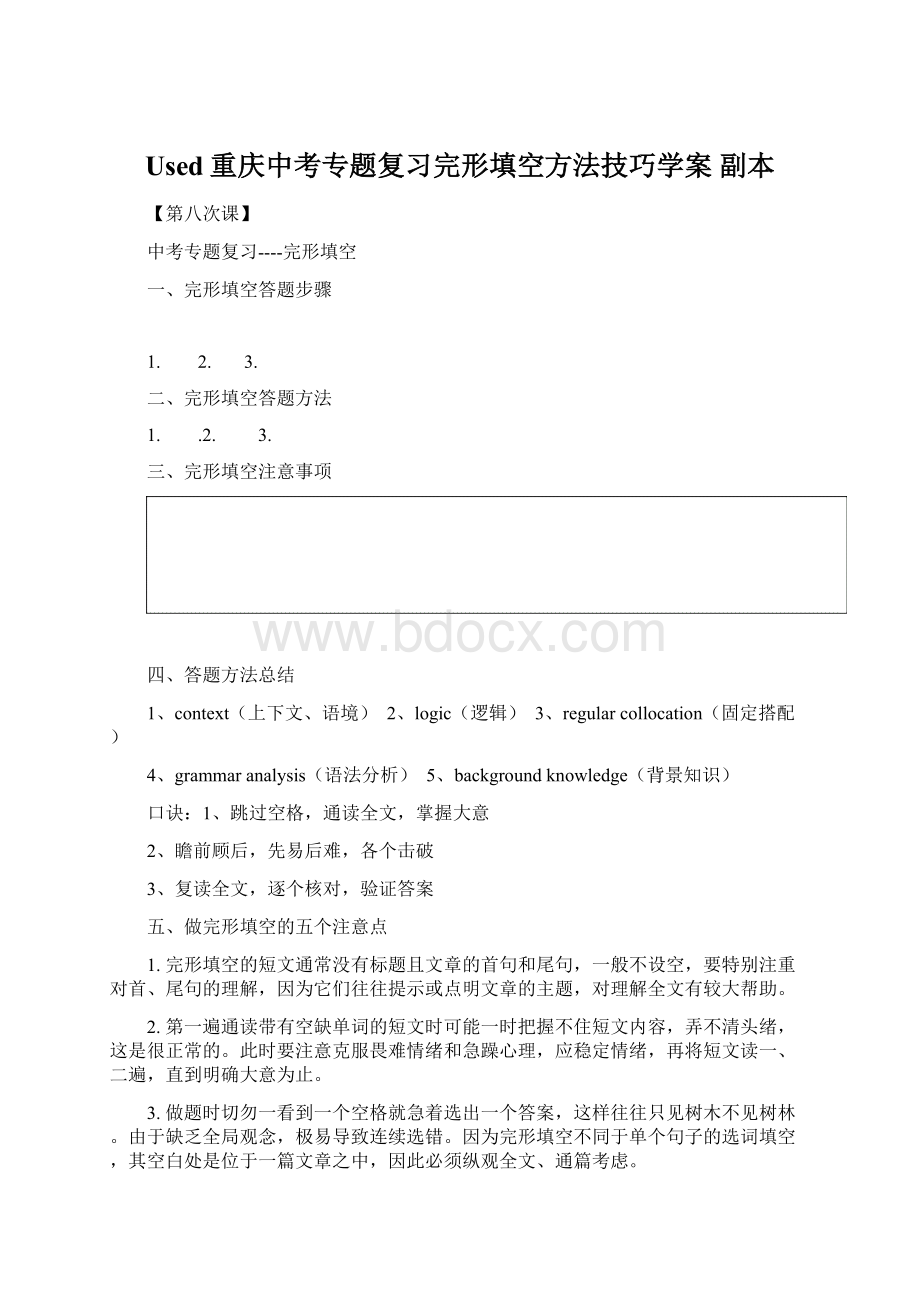Used重庆中考专题复习完形填空方法技巧学案副本.docx
《Used重庆中考专题复习完形填空方法技巧学案副本.docx》由会员分享,可在线阅读,更多相关《Used重庆中考专题复习完形填空方法技巧学案副本.docx(15页珍藏版)》请在冰豆网上搜索。

Used重庆中考专题复习完形填空方法技巧学案副本
【第八次课】
中考专题复习----完形填空
一、完形填空答题步骤
1.2.3.
二、完形填空答题方法
1..2.3.
三、完形填空注意事项
四、答题方法总结
1、context(上下文、语境)2、logic(逻辑)3、regularcollocation(固定搭配)
4、grammaranalysis(语法分析)5、backgroundknowledge(背景知识)
口诀:
1、跳过空格,通读全文,掌握大意
2、瞻前顾后,先易后难,各个击破
3、复读全文,逐个核对,验证答案
五、做完形填空的五个注意点
1.完形填空的短文通常没有标题且文章的首句和尾句,一般不设空,要特别注重对首、尾句的理解,因为它们往往提示或点明文章的主题,对理解全文有较大帮助。
2.第一遍通读带有空缺单词的短文时可能一时把握不住短文内容,弄不清头绪,这是很正常的。
此时要注意克服畏难情绪和急躁心理,应稳定情绪,再将短文读一、二遍,直到明确大意为止。
3.做题时切勿一看到一个空格就急着选出一个答案,这样往往只见树木不见树林。
由于缺乏全局观念,极易导致连续选错。
因为完形填空不同于单个句子的选词填空,其空白处是位于一篇文章之中,因此必须纵观全文、通篇考虑。
4.每篇完形填空所设的空多以实词为主,所提供的四个备选项中只有一个是正确的,其他三项均为干扰项。
而干扰项也多半与前、后的句子或词组可以形成某种搭配,即如单从语法角度判断则无法确定,还必须从语篇意义上加以鉴别。
5.动笔时先易后难,先完成容易、有把握的答案,这样可以增强自信心,然后再集中精力解决难点。
对于实在无法确定的,可以从文中同样结构或类似结构中寻找提示,大胆地作出猜测。
六、完形填空专项实践练习
(1.)
Bill,athirteen-year-oldboy,thoughthehadgrownuptobeaman.Buthisparentstoldhim,“Youwon’tbearealmanuntilyoubeginto46helpingothers.”
Onemorning,hisparentsgavehimsomemoneyto47somemilkforthem.Outsideashophesawahomelessoldmanwholookedvery48.Billwenttohimandasked,“What’swrongwithyou?
”Theoldmananswered,“I’mhungry.Ihaven’thadanyfoodfortwodays.”
Allthethoughtofhisparents’words,Billsaidtotheoldman,“Let’sgotothe49.”
Whentheygotthere,Billaskedthewaitertobringoutbreadandcoffeetotheoldman.Theoldmanfinishedthemealquickly.Afterthewaiter50theplateandthecup,theoldmansaid,“Sorryforgiveyoutoomuch51.I’mfinenow.I’ll52forgetyourkindness!
Youareaverygoodyoungman.”
Billwas53whenheheardthis.Justwhenhewantedtopayforthemeal,thewaitercame.Billandtheoldmanlearned54thathefoodwasfree55itwasthebirthdayoftheboss,andtheywerethefirstcustomerthatday.
46.A.thinkaboutB.dependonC.giveupD.goon
47.A.lendB.buyC.drinkD.borrow
48.A.afraidB.gladC.sickD.angry
49.A.bankB.libraryC.hospitalD.restaurant
50.A.sentoutB.gotdownC.gavebackD.tookaway
51.A.excuseB.adviceC.troubleD.difficulty
52.A.neverB.alwaysC.usuallyD.sometimes
53.A.nervousB.pleasedC.sorryD.shy
54.A.insurpriseB.asusualC.onceagainD.atfirst
55.A.whenB.untilC.unlessD.because
(2)FashionnotonlyinClothes
Formostpeople,theword“fashion”means“clothes”.Butpeoplemayaskthequestion,“What___1___areinfashion?
”Andtheyusetheadjective“fashionable”inthesameway:
“Shewaswearinga___2___coat.”“Hisshirtwasreallyafashionablecolor.”
Butofcoursetherearefashions___3___manythings,notonlyinclothes.Therearefashionsinholidays,inrestaurants,infilmsandbooks.Thereare___4___fashionsinschoolsubjects,jobs…andinlanguages.Fashions___5___astimegoes.___6___youlookatpicturesofpeopleorthingsfromthepast,youwillseethatfashionshavealwayschanged.AnEnglishhouseof1750wasdifferent___7___oneof1650.Afashionablemanin1780lookedverydifferentfromhisgrandsonin1850.
Todayfashionschangeveryquickly.Wehearaboutthings___8___morequicklythaninthepast.Newspapers,radios,telephonesandtelevisionssendinformationfromonecountry___9___anotherinafewhours.Newfashionsmeanthatpeoplewill___10___newthings,soyouseethereismoneyinfashion.
1.A.colorB.clothesC.foodD.money
2.A.niceB.beautifulC.expensiveD.fashionable
3.A.atB.byC.inD.with
4.A.evenB.justC.onlyD.already
5.A.changeB.changesC.arechangedD.changed
6.A.WhereB.WhenC.IfD.As
7.A.onB.forC.withD.from
8.A.veryB.muchC.tooD.quite
9.A.inB.byC.toD.with
10.A.buyB.sellC.getD.use
(3)
Thebestwayoflearningalanguageisalwaysusingit.ThebestwayoflearningspokenEnglishis___1___inEnglishasmuchaspossible.Sometimesyou’llgetyourwords___2___upandpeoplewillnot___3___you.Sometimespeoplewill___4___thingstooquicklyandyoucan’tunderstandthem.But___5___youkeepyoursenseofhumor,youcanalwayshaveagoodlaughatthemistakesyou___6___.Don’tbeunhappyifpeopleseemtobelaughing___7___yourmistakes.It’s___8___forpeopletolaughatyourmistakesthantobeangrywithyou,___9___theydon’tunderstandwhatyouwesaying.ThemostimportantthingforlearningEnglishis:
“Don’tbe___10___ofmakingmistakesbecauseeveryonemakesmistakes.”
1.A.listening B.talkingC.readingD.writing
2.A.mixB.mixingC.tomix D.mixed
3.A.likeB.knowC.helpD.understand
4.A.sayB.talkC.tellD.speak
5.A.ifB.whenC.sinceD.although
6.A.haveB.makeC.takeD.product
7.A.atB.onC.inD.for
8.A.goodB.betterC.bestD.well
9.A.unlessB.becauseC.assoonasD.aslongas
10.A.sadB.worryC.afraidD.unhappy
(4)
Weshouldrememberthatwealllearnedourownlanguagewellwhenwewerechildren.Ifwecouldlearn___1___secondlanguageinthesameway,itwouldnotseemso___2___.Think___3___whatasmallchilddoes.Itlistenstowhatpeoplesayandtries______4______whatithears.Whenitwantssomething,ithastoask___5___it.Itisusingthelanguage,talkinginit,andthinkinginitallthetime.Ifpeople___6___useasecondlanguageallthetime,theywouldlearnitquickly.
Welearnourownlanguage___7___hearingpeoplespeakit,notbyseeingwhattheywrite.Weimitate___8___whatwehear.Inschool,thoughyoulearntoreadandwrite___9___tohearandspeak,itisthebestway___10___allthenewwordsthroughtheear.Youcanreadthem,speakthem,andwritethemlater.
1.A.aB.anC.theD./
2.A.easyB.fastC.simpleD.difficult
3.A.ofB.outC.overD.about
4.A.imitateB.imitatingC.toimitateD.imitated
5.A.ofB.forC.afterD.about
6.A.couldB.shouldC.wouldD.hadto
7.A.ofB.byC.onD.with
8.A.whatB.whenC.whereD.how
9.A.andB.butC.aswellasD.aslongas
10.A.learnB.learnsC.learningD.tolearn
(5)
Therehavebeenmanygreatinventionsthatchangethewaywelive.Thefirstgreat___1___wasonethatisstillveryimportanttoday—thewheel.Thismadeiteasyforman___2___heavythingsandtotravellongdistances.Forhundredsofyearsafterthat,therewere___3___inventionsthathadasmucheffectasthewheel.Thenintheearly1800’stheworldstartedtochange___4___.Therewaslittleunknownlandleftintheworld.Peopledidnothavetoexploremuchanymore.Inthesecondhalfofthe19thcenturymanygreatinventionsweremade.___5___themwerethecamera,theelectriclightandtheradio.Thesehaveallbecomeabigpartofourlifetoday.
Thefirstpartofthe20thcenturysawmoregreatinventions.Thehelicopterin1909.Movies___6___soundin1926.Thecomputerin1928.Andjetplanesin1930.Thiswasalsoatimewhenanew___7___wasfirstmade.Nyloncameoutin1935.Itchangedthekindofclothespeoplewear.Ofcoursenewinventionscontinuedtobemade.Manbeganlooking___8___waystogointospace.Russiamadethefirststep.ThentheUnitedStatestookanother.Sincethenothercountries,includingChinaandJapan,___9___theirstepsintospace.In1969mantookhisbiggeststepawayfromearth.___10___firstwalkedonthemoon.Thiswascertainlyjustabeginning.Newinventionswillsomedayallowustodothingswehaveneveryetdreamedof.
1.A.scientistB.artistC.musicianD.invention
2.A.carryB.carryingC.tocarryD.carried
3.A.fewB.afewC.littleD.alittle
4.A.largelyB.differentlyC.greatlyD.freely
5.A.BetweenB.AmongC.BeforeD.After
6.A.inB.ofC.onD.with
7.A.mistakeB.productC.worldD.material
8.A.forB.outC.afterD.around
9.A.madeB.weremadeC.havemadeD.hademade
10.A.ChineseB.JapaneseC.AmericansD.Russians
【答案与解析】
1.D。
该题用语境推测法。
根据首句所提供的语境——伟大的发明,可推测出本句所列举的应是“第一项大发明”。
(from)
2.C。
该题用语法分析法。
本句中的it是形式宾语,真正的宾语是后面的动词不定式短语tocarryheavythingsandtotravellongdistances。
3.A。
该题测试不定代词的用法。
invention是可数名词,不能用little和alittle来修饰,这样就可以否定后面两个选项。
根据上下文所提供的语境,可推知:
在车轮被发明之后到18世纪,车轮是最重要的发明,自然就是“几乎没有像车轮一样有影响的发明”,应选表示否定意义的few。
4.C。
该题测试副词的辨析,应用语境推测法。
根据上下文可知此句意为“19世纪早期世界开始发生巨大的变化”。
largely是“主要地,在很大程度上”的意思,differently是“不同地”的意思,greatly是“很,非常”的意思,freely是“自由地,不受控制”的意思。
5.B。
根据上下文语境,如选Before和After,显然语句不通;between指“两者之间”,也不能被选。
6.D。
该题测试介词的用法。
“有声电影”指画面伴随有声音的电影,这四个介词中,只有with有“随着”的意思。
7.D。
根据下文提供的语境可知“1935年生产出了尼龙”,而尼龙是一种生产布匹的原料。
8.A。
根据下文的“俄罗斯迈出了第一步,美国紧随其后”,可推知上文是“人类开始寻找进入太空的方法”。
这四个词组中,lookfor意为“寻找”,lookout意为“小心,留心”,lookafter意为“照料”,lookaround意为“环顾四周”,只有lookfor才合乎句子要求。
9.C。
sincethen是现在完成时的标志,意思是“此后,从此一直”。
在这四个被选项中,made和weremade是一般过去时,hadmade是过去完成时,只有havemade是现在完成时。
10.C。
这是一道常识题。
美国人首次登月是家喻户晓的常识。
MysonJoeywasbornwithclubfeet.Thedoctorssaidthatwithtreatmenthewouldbeabletowalk,butwouldneverrunverywell.Thefirstthreeyearsofhislifewas___1___inhospital.Bythetimehewaseight,youwouldn’tknowhehasaproblemwhenyousawhim___2___.
Childreninourneighborhoodalwaysranaround___3___theirplay,andJoeywouldjumpandranandplay,___4___.Wenevertoldhimthatheprobablywouldn’tbe___5___torunliketheotherchildren.Sohedidn’tknow.
In___6___gradehedecidedtojointheschoolrunningteam.Everydayhetrained.Heranmorethananyoftheothers,___7___onlythetopsevenrunnerswouldbechosentorunforthe___8___.Wedidn’ttellhimheprobablywouldnevermaketheteam,sohedidn’tknow.
Heranfourtofivemileeveryday—evenwhenhehadafever.Iwas___9___,soIwentto_